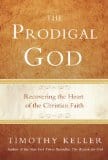The Prodigal God


The parable of the prodigal son, found in Luke 15, is one of the best known stories of Jesus. In short, a son leaves home and squanders his inheritance. When things get bad, the son decides to return home to work as a servant. To his surprise, his father welcomes him back and throws a lavish feast to mark his return to the family. The father in this story represents God, and the son represents sinners who are forgiven and embraced despite their past.
But this isn’t the full story. There are, of course, two sons in the story, and the targets of this parable are not the “‘wayward sinners’ but religious people who do everything the Bible requires.” Jesus told this story “not to warm our hearts but to shatter our categories,” writes Tim Keller.
In The Prodigal God, Keller helps us understand:
- There are two ways to rebel against God: the younger brother way (openly rebelling) and the elder brother way (keeping moral laws and never rebelling). Both are self-salvation projects, but the second is more dangerous.
- The gospel is radically different from religious moralism. The gospel is for the rebellious, but it’s also for the righteous and their “damnable good works.”
- The gospel provides what we need to change, and it provides us with all that we truly hope for.
During the years I was working on these two books, my provisional titles were “The Gospel for Non-believers” (The Reason for God) and “The Gospel for Believers” (The Prodigal God). This second book is my way of doing what Martin Luther directed us Christian ministers to do. “This…truth of the gospel…is also the principal article of all Christian doctrine, wherein the knowledge of all godliness consists. Most necessary it is, therefore, that we should know this article well, teach it unto others, and beat it into their heads continually.”
In some ways, The Reason for God expanded on Keller’s approach to apologetics. You got more than you would encounter just listening to his sermons. The Prodigal God, on the other hand, is more like a distillation of his preaching. You get less than you’d get in a year of listening to his sermons, but you get at the heart. It’s a much smaller book too, by the way.
If you are familiar with Keller’s preaching, then the material in this book will not be new to you. But don’t underestimate its power. The gospel is for both the irreligious and the moralistic. It may just be what we moralistic elder brothers need to join the Father’s feast for the very first time.
More from Amazon.com | Amazon.ca





